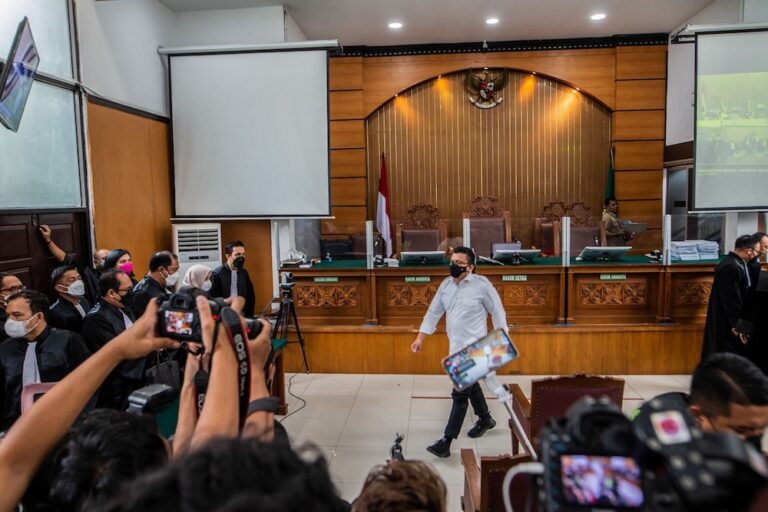(SEAPA/IFEX) – SEAPA is concerned by the passing of the Electronic Information and Transaction Law in Indonesia on 25 March 2008, which has been criticised by the Press Council as falling short of international trends and standards. The law, intended to combat online crime, pornography, gambling, blackmail, lies, threats and racism, also prohibits citizens from […]
(SEAPA/IFEX) – SEAPA is concerned by the passing of the Electronic Information and Transaction Law in Indonesia on 25 March 2008, which has been criticised by the Press Council as falling short of international trends and standards.
The law, intended to combat online crime, pornography, gambling, blackmail, lies, threats and racism, also prohibits citizens from distributing in any electronic format information that is defamatory, punishing transgressors with a maximum of six years in prison or a fine of one billion Rp (approx. US$109,000) or both.
In a 7 April statement, Indonesia’s Press Council said the provisions are reminiscent of the archaic colonial laws inherited from the Dutch, which criminalized defamation of rulers. The council said such restrictions should not have been allowed in the wake of the Constitutional Court’s landmark rulings related to defamation. In December 2006 and July 2007, the court declared unconstitutional articles that criminalize insulting the president, vice-president and government.
The council is seeking a constitutional review of the law for the threat it poses to press freedom and free expression, identifying articles 27 (3) and 28 (2) as the pitfalls. The former relates to distribution or transmission of electronic information or documents that contain insult and/or defamation, while the latter touches on the deliberate spreading of information intended to propagate hatred or enmity.
At least 50 countries have amended their laws concerning fraud, insult and defamation, making them civil infractions, rather than criminal offences, said the council. “In fact, a few countries have abolished altogether laws on spreading hate or insult because it is difficult to prove and is very subjective,” the council added.
In seeking a review of the law, the council is also pressing for an explicit exception for the press, fearing that reporters who choose the online medium to expose corruption, manipulation and disputes may be deemed as “spreading hatred” or “defamation”, and subjecting them to charges under this law.
The council is not taking seriously the assurances given by Edmon Makarim, a member of the legal staff with the Ministry of Communications and Informatics, who claimed that the problematic articles would not affect the press. Edmon reportedly said the electronic information law did not mention anything at all about the press which, he added, is already protected under the Press Law. However, civil society groups are not giving much credence to that as prosecutors tend to ignore the Press Law when investigating press-related disputes.
Bloggers, too, are concerned that the new law on electronic information and transaction would put a stop to their activities as many put out “sensitive” content about public figures and issues at large.
Even a link to a website containing defamation can land one into trouble, blogger Enda Nasution said at a recent meeting in the capital Jakarta, organized by the British Council.
SEAPA ( http://www.seapa.org ) is a coalition of press freedom advocacy groups from Indonesia, the Philippines and Thailand. Established in November 1998, the network aims to unite independent journalists and press-related organisations in the region into a force for the protection and promotion of press freedom and free expression in Southeast Asia.


